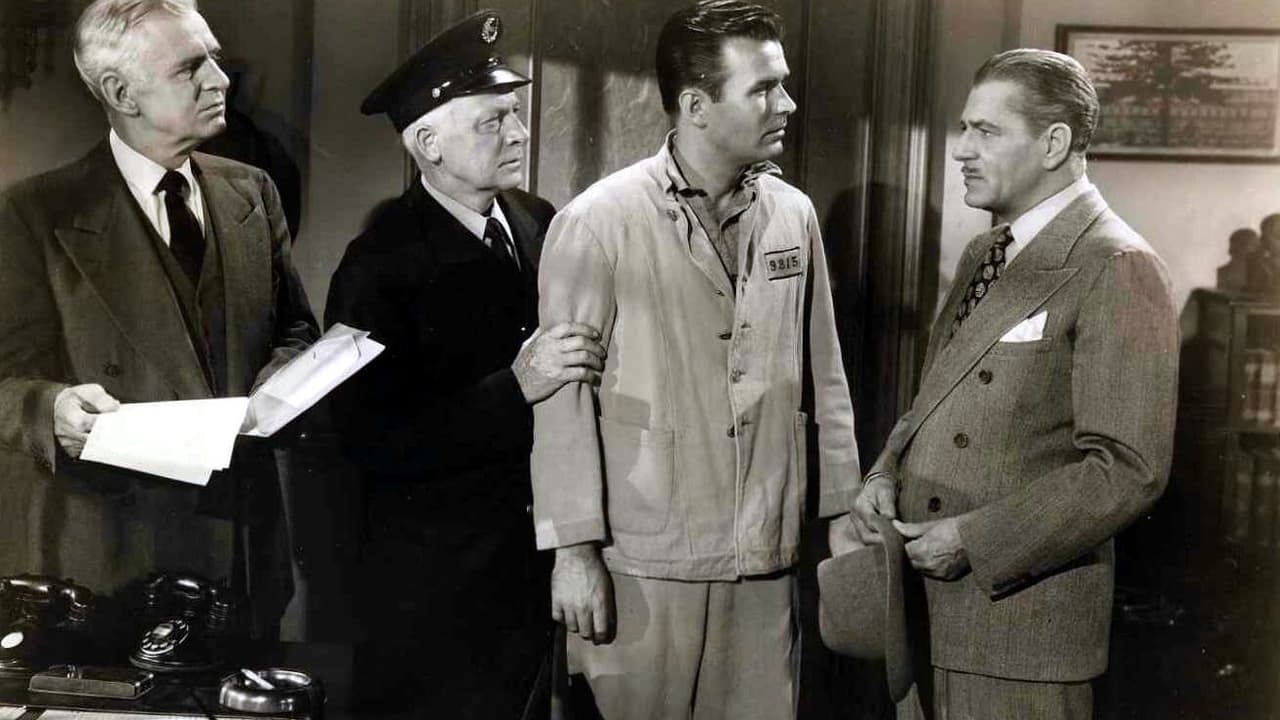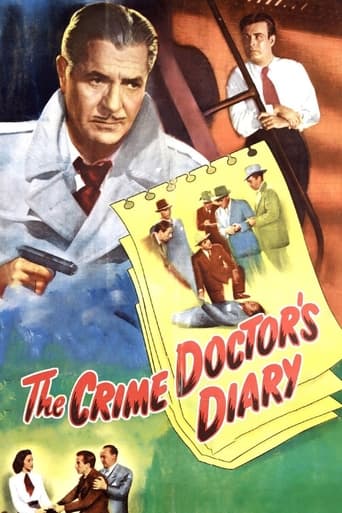

Warner Baxter ended his stint at Columbia Pictures Crime Doctor series with one of the best of the series in Crime Doctor's Diary. This concerns Baxter okaying the parole of Stephen Dunne who was released after serving three years of a ten year term for arson.As all convicts he claims his innocence and even the Crime Doctor is not first willing to believe him. Allegedly Dunne set a fire at the business of Robert Armstrong who is a gangster who has a hold on the jukebox concession.There's a new business however which seemed to anticipate IPODs by a few generations. You call a number from a place where a machine connected to the central location and request a song. A record will then play over a loudspeaker. The company stores an infinitely more amount of 78 RPMs than any jukebox will. Armstrong is not happy that this is cutting in on his business. He even more resents Dunne cutting in on his time with Adele Jergens.Another murder happens and Dunne escapes the cops, but takes a cop's bullet. Will Dr. Ordway clear Dunne of this murder and maybe the original charge? You know the Crime Doctor will.Stealing the film in every scene he's in is Whit Bissell who plays a slightly demented brother of Don Beddoe. Bissell has the idea he's a song writer and is forever plugging this incredibly bad song he wrote about his little French horn as a kid that he toodely tooted all day. But Bissell demented though he is actually has the key to the whole mystery. The future Ms. Moneypenny Lois Maxwell is also here carrying a big old torch for Stephen Dunne. For a B film from a movie series The Crime Doctor's Diary is one of the best of the series and could stand up to more sophisticated detective stories. It moves without a second of wasted film frames and the editing of the story is much better than you get in most films of this type.Warner Baxter did only three more films after The Crime Doctor's Diary. This one is a really good introduction to him as a player in his later years.
... View MoreAs has earlier been commented, Whit Bissell's performance here as an aspiring and mentally challenged composer is a scene-stealer. He intuitively takes the film to another plane with a blissful unawareness that is inadvertent and yet elevating. Along with the tragic end of his character Tom Lister in "Brute Force" this is one of his most affecting performances of the forties. Probably the second most affecting. He seems to inhabit this role as opposed to the other actors in the film who seem to just be going through their paces robotically and quite superficially with little or no special touch of humanity other than to move the story along so they can pick up their check. The film stops when he comes on the screen and you do a double take because you sense this performance is a silk purse in a sow's ear of a film. His character Pete Bellem, touching, halting and muddling along, stays with you when everyone else in the film just fades away into cardboard kitsch heaven. And that song of his so conscientiously crumbles upon itself that it takes on a profound, sad and yet sweet resonance which belies its silliness. Whit was a talented pianist, by the way. He puts that to use here (and in some other roles through the years). He was also a fencing enthusiast in real life. His character Pete Bellem, harmless and hampered and even harassed here by those who have no time of day for him and, in their self-anointed intellectual superiority, belittle what they feel are his mental limits, may be in a world of his own but in this world of charlatans and floozies and hucksters, his seems a better, kinder world. His fingers are his intellect. He loves his ditty no end and to the exclusion of all critique. He is a man-child in this not so promised land and (toot-toot) one you root for. He is the heart and very much the only soul of this film and definitely the only one who stays with you as the credits roll. Great job. Rest in peace, Whit.
... View MoreI was a bit surprised with this film, as in the Leonard Maltin Guide this film got a pretty poor rating and sounded like the worst film of this series. However, it was a pretty decent film and definitely NOT the worst of the series (this was CRIME DOCTOR'S GAMBLE, 1947) and was a nice final film of the series.Doctor Ordway's wonderful psychiatric prowess is called into question, as a man he recommended for parole is the prime suspect in a revenge murder. Part of this was because the guy did act like he'd done it, but the true reason came out in a very nifty ending---where you learn who and how they set him up for the fall. There were only two small problems with the film. The song that was sung again and again was absolutely horrid and tough on the ears. Also, the writing, except for one bad bit of dialog, was just fine. The bad dialog was as follows:(lady speaking to man) "Goldie, you're a gentleman" (after which, the man responds) "I wish you were"Huh?! Did he wish SHE were a gentleman or did he want her to get a sex change or what?! While this was a very MINOR problem with the film, it did make me laugh!
... View MoreWARNER BAXTER was approaching the end of his life by the time he did THE CRIME DOCTOR'S DIARY, the last film in the Crime Doctor series.This above average programmer is slickly produced, written and acted in true "Crime Doctor" style with some nice performing by LOIS MAXWELL and a good role at the center for STEPHEN DUNNE as an innocent man released from prison and, as it turns out, wrongly framed for arson.The plot has to do with a record music company delivering call-in juke-box service where patrons could request certain records to be played by request, a forerunner of disc jockeys. Haven't been aware of the existence of this sort of thing until I saw MY DREAM IS YOURS (same year) wherein Doris Day worked in such a record establishment where she could be heard by bar patrons.WHIT BISSELL, who turns up in so many films from the '40s and '50s, does a neat job as a mentally deficient but good-humored man trying to get the music industry interested in his foolish folk song. ADELE JERGENS is the girlfriend of Dunne who has the courage to help him when he's on the lam after being hurt by a police bullet, and ROBERT ARMSTRONG is her jealous boss.It's noticeable that there's no strenuous action staged for Baxter, as there usually is in a "Crime Doctor" movie, since the actor was obviously not well during filming. He gets to comment briefly on things and hasn't much of a role at all while others get to hold center stage.But it makes a good crime doctor story and unfolds in a crisply efficient sort of way to make pleasing entertainment. STEPHEN DUNNE and LOIS MAXWELL are both seen to advantage here.Summing up: Not bad at all. One of the more interesting in the series.
... View More